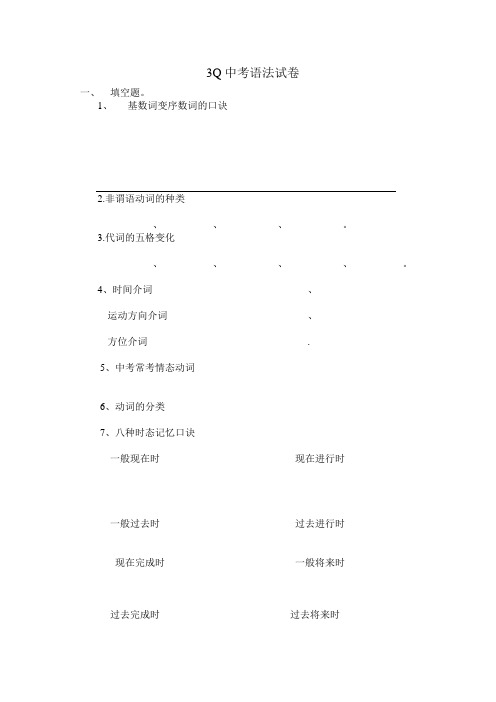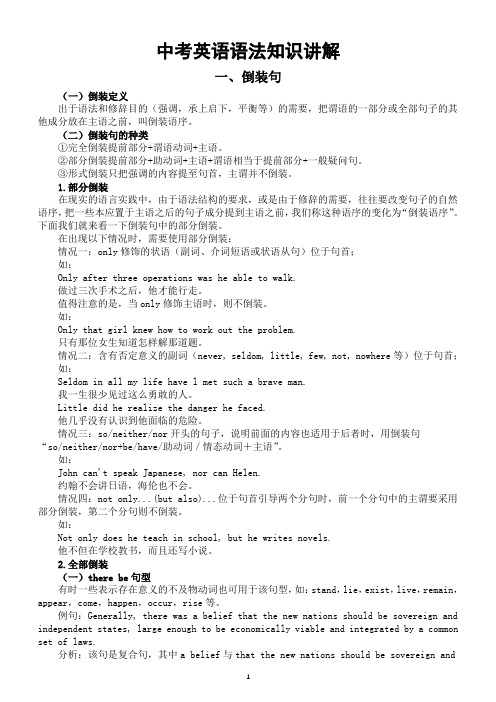3Q中考英语语法
初中英语中考语法知识归纳

初中英语中考语法知识归纳初中英语中考语法知识归纳英语是中考科目中非常重要的一门学科,对学生的要求也越来越高,那么学生在复习的时候要着重复习哪些知识点呢?下面是店铺为大家整理的初中英语中考知识总结,希望对大家有用!初中英语中考知识1. 英语的词类句子要由词组成,英语词类有十种:句中成分用实词,名、代、动、副、数、形容;冠、介、连词和感叹,虚词附加或沟通。
词类功能掌握了,造句之时好运用。
2. 语序歌主、谓、宾、表同汉语,定语有同也有异。
状语位置更特殊,不能全和汉语比。
3. 肯定句变一般疑问句have和be提句首,其它助词Do开头。
时间、人称由do变,动词只把原形留。
谓语助词有几个,第一助词提句首。
4. 肯定句变否定句否定句中加not,放在be和have后。
其它要加动词do,do的后面加not,时间、人称由do变,动词原形总保留。
谓语若是助词多,not紧跟第一个。
5. 名词的`所有格名词只变数,不分主宾格。
人和动物类,可变所有格。
撇(’)后加s,相当汉语“的”。
时间、距离等,也变所有格。
6. 名词变复数单数变为复数式,加上“s”统言之。
下列结尾名词后,要加“s”先加“e”:发音[∫][t∫][s]和[z],或是辅音加“o”时。
有些名词变复数,词尾变化要注意:“y”前字母是辅音,一律变“y”为“ie”;遇到“f / fe”,有时需要变“ve”少数名词不规则,特别情况靠硬记。
初中英语语法知识介词by的用法1、意为“在……旁”,“靠近”。
Some are singing and dancing under a big tree。
Some are drawing by the lake。
有的在大树下唱歌跳舞。
有的在湖边画画儿。
2、意为“不迟于”,“到……时为止”。
Your son will be all right by supper time。
你的儿子在晚饭前会好的。
How many English songs had you learned by the end of last term?到上个学期末你们已经学了多少首英语歌曲?3、表示方法、手段,可译作“靠”、“用”、“凭借”、“通过”、“乘坐”等。
初三英语语法知识考点总结

初三英语语法知识考点总结初三英语语法知识考点总结一. 介词by的用法1. 意为“在……旁”,“靠近”。
Some are singing and dancing under a big tree. Some are drawing by the lake.有的在大树下唱歌跳舞。
有的在湖边画画儿。
2. 意为“不迟于”,“到……时为止”。
Your son will be all right by supper time.你的儿子在晚饭前会好的。
How many English songs had you learned by the end of last term?到上个学期末你们已经学了多少首英语歌曲?3. 表示方法、手段,可译作“靠”、“用”、“凭借”、“通过”、“乘坐”等。
The monkey was hanging from the tree by his tail and laughing.猴子用尾巴吊在树上哈哈大笑。
The boy’s father was so thankful that he taught Edison how to send messages by railway telegraph.孩子的父亲是那么的感激,于是他教爱迪生怎样通过铁路电报来传达信息。
4. 表示“逐个”,“逐批”的意思。
One by one they went past the table in the dark.他们一个一个得在黑暗中经过这张桌子。
5. 表示“根据”,“按照”的意思。
What time is it by your watch?你的表几点了?6. 和take , hold等动词连用,说明接触身体的某一部分。
I took him by the hand.我拉住了他的手。
7. 用于被动句中,表示行为主体,常译作“被”、“由”等。
English is spoken by many people.英语被许多人说。
3Q中考

3Q中考语法试卷一、填空题。
1、基数词变序数词的口诀___________________________________________________________________________________________________________2.非谓语动词的种类___________、__________、___________、___________。
3.代词的五格变化___________、__________、___________、___________、__________。
4、时间介词_______________________________、运动方向介词____________________________、方位介词________________________________.5、中考常考情态动词_____________________________________________6、动词的分类_________________________________7、八种时态记忆口诀一般现在时现在进行时一般过去时过去进行时现在完成时一般将来时过去完成时过去将来时二、选择题。
1.This is the __________time in________days that he had made the samemistakeA,second , third B.two ,three C.two , third D.second, th.ree2. Which room are you living?In________on the ________floorA,Room303 ,two B.303Room,two C.Room303, second D. 303 Room, second3. It took me ___________to find out the key to the drawerA.one and half hoursB.one and a half hoursC.one and a half hourD.one and half hour4.When is Henry’s birthday party ,Lynn?The 18th ,________about three o’clock in the afternoonA.in B,at C.on D.to5. Who will be _______duty tomorrow? -------- Susan willA.atB.onC.forD.in6.look! a blind man is in the middle of the street . It’s too dangerous .Let’s go and help him walk ________the roadA. throughB.alongC.acrossD.over7.Shaolin Temple_______lies in the west o f Zhengzhou welcomes the visitorsboth at home and abroad.A. whereB. whichC.whoD. what8.What a nice MP5!Whose is it?It’________. My father bought it for meA .me B. him C.his D.mine9.This year our school is ________than it was last year.A.much more beautifulB. much beautifulC.the most beautifulD. beautiful10.Look!How_________the boys are !Yes,they won the game this afternoonA. excitingB. excitementC. exciteD. excited11.The ______friends you have , the _____you will beA.more, happyB.many, happyC.more , happierD.many , happier12.You have already tried your best ,so you ________worry about the matterA.can’tB.needn’tC.mustn’tD.couldn’t13.Must I finish my homework at school?No , you ___________. You can do it at home.A.can’t B.mustn’t C.needn’t D.won’t14.Is the man in white our manager ?It _______be him . He has just left for shanghaiA. mustB. mayC. can’tD.couldn’t15.My grandpa used to play _______violin after dinner ,but now he is used toplaying________-chess with me.A /, a B. the , / C.the , the D.the , a16.Shall we pay _______visit to Expo 2010,shanghai?No, I’d rather stay at home and play_____footballA.a, theB.the , aC. /, theD. a , the17.Peter is busy_________at school,but he never forgets___________exerciseevery day.A.working ,doingB.working, to do.C. work, doingD. to work, to do18. --------we are going to Beijing Park.---- Enjoy______A.yourselvesB.yourC.yoursD.yourself19._____ you____ your drawing?--Not yet. It will be done in a few minutes.A. Did; finishB. Will; finishC. Do; finishD. Have; finished20 --Do you know the boy over there?--Sure, I ______him for many years.A. knewB. will knowC. have knownD. known21.—These farmers have been to the United States.–Really? When ______ there?A. will they goB. did they goC. do they goD. have they gone22. The fruit salad tastes delicious. Could you tell me _______________?A.where to do it B.when to do it C.what to do it D.how to do it23. what can you see under the tree?I can see _________old woman with _______cat sitting on the chairA.a, anB.a , aC.an ,anD.an , a24.Excuse me ,how does this number 20,135 read?It reads______________________________A, twenty thousand one hundred and thirty-fiveB.twenty thousand one hundred thirty-fiveC.twenty thousands one hundred and thirty-fiveD.twenty thousands one hundred and thirty-five25.which on is the smallest of the four? ____________A.Two-thirdsB. A halfC. A quarterD. Three-fourths三、1、主谓宾(时态考查)I ______an apple every dayI ______an apple yesterdayI ______an apple nowI______an apple this time yesterdayI______an apple tomorrow( I said )I______an apple the next dayI_____already______an appleI _____an apple by the time I came here2、Adj 、adv考查1.The girl is ______,and she drinks the water _______(thirsty)2.You make me _____(sad) when I am ______(happy), she makes me_____(angry)when I eat_____(happy)3.She listens to Tory very _________(careful)4.Run_______(quick)5.It’s so _____(easy), I can do it _____(quick)3、Num 考查1.She was born in the_________(1980),He was born in______(1987)2.三分之一:三分之二:3.在他七十几岁的时候:In his ________(seventy)4.She is the _______ (1)student to come to school today5.Here are _____ (8)apples on the desk.四、写作―世界无烟日(Non-smoking Day)‖那天,某中学对该校学生吸烟情况进行了一次调查,结果如图所示。
初三英语语法整理汇总

初三英语语法整理汇总虚拟条件句的三种基本类型1、若与现在事实相反,条件从句的谓语用过去式(be通常用were),主句谓语用“should (would,could,might)+动词原形”:If you took a taxi,you’d get there quicker. 如果你坐出租车去,你可以快一点到那里。
(但你不坐)2、若与过去事实相反,条件从句的谓语用过去完成时(had+过去分词),主句谓语用“should (would,could,might)+have+过去分词”:If I’d left sooner,I’d have been on time. 要是我早点动身,我就准时到了。
(但我动身太迟了)3、若与将来事实相反,条件从句的谓语用过去式(be通常用were),主句谓语用“should (would,could,might)+动词原形”:If he went,would you go too? 如果他去,你也去吗?(大概他不会去)宾语从句1、由that引导表示陈述意义that可省略He says (that) he is at home. 他说他在家里。
2、由if,whether引导表示一般疑问意义(带有是否、已否、对否等)I don’t know if /whether Wei Hua likes fish. 我不知道韦华是否喜欢鱼。
3、由连接代词、连接副词(疑问词)引导表示特殊疑问意义Do you know what he wants to buy? 你知道他想要买什么吗?4、从句时态要与主句一致,当主句是一般现在时,从句根据情况使用任何时态He says (that ) he is at home. 他说他在家里。
当主句是一般过去时,从句应使用过去某时态(一般过去时,过去进行时,过去将来时,过去完成时)He said (that) he was at home. 他说他在家里。
初中三年英语语法知识归纳最全的中考英语语法大全汇总

一.句子结构及句型1.简单句:由一个主语和一个谓语组成的句子。
2.并列句:由两个或多个相互独立的简单句连接而成的句子。
3.复合句:由一个主句和一个或多个从句连接而成的句子。
4.疑问句:用来提问的句子,常以助动词、系动词或情态动词开头。
5.祈使句:用来表示命令、请求、建议等的句子。
6.感叹句:表示强烈的感情、情绪或意义的句子。
二.时态的用法1.一般现在时:表示经常性或客观事实。
2.一般过去时:表示过去一些时间发生的动作或状态。
3.现在进行时:表示现在进行或暂时的动作。
4.过去进行时:表示过去时进行或暂时的动作。
5.将来时:表示将来要发生的动作或存在的状态。
三.语态的用法1.一般现在时的被动语态:主语是动作的承受者。
2.一般过去时的被动语态:主语是动作的承受者。
3.现在进行时的被动语态:主语是动作的承受者。
4.过去进行时的被动语态:主语是动作的承受者。
四.动词的用法1.及物动词:必须接宾语才能构成完整的意思。
2.不及物动词:不需要接宾语就能构成完整的意思。
3.能愿动词:包括情态动词和行为动词,用于表示能力、愿望、可能性等。
五.名词的用法1.可数名词:表示可以数的事物或物体。
2.不可数名词:表示不可数的抽象概念、物质或一类事物。
3.可数名词的数量表示:使用具体数字、数词、不定代词等。
六.代词的用法1.主格代词:在句子中作主语或表语。
2.宾格代词:在句子中作宾语或介词宾语。
3.物主代词:表示所有关系,用来修饰名词。
4.反身代词:表示动作反映到自己身上。
七.形容词的用法1.表示性质或特征的词汇。
2.修饰名词或代词。
3.用比较级和最高级表示程度或比较。
八.副词的用法1.表示时间、地点、方式、程度等。
2.修饰动词、形容词、副词和句子。
九.介词的用法1.表示时间、地点、方式不同的介词。
2.用于修饰名词或代词。
十.连词的用法1. 并列连词:连接两个并列的分句,如and, but, or等。
2. 从属连词:连接主句和从句,如when, because, if等。
初中英语2023中考语法知识讲解(倒装句+强调句)

中考英语语法知识讲解一、倒装句(一)倒装定义出于语法和修辞目的(强调,承上启下,平衡等)的需要,把谓语的一部分或全部句子的其他成分放在主语之前,叫倒装语序。
(二)倒装句的种类①完全倒装提前部分+谓语动词+主语。
②部分倒装提前部分+助动词+主语+谓语相当于提前部分+一般疑问句。
③形式倒装只把强调的内容提至句首,主谓并不倒装。
1.部分倒装在现实的语言实践中,由于语法结构的要求,或是由于修辞的需要,往往要改变句子的自然语序,把一些本应置于主语之后的句子成分提到主语之前,我们称这种语序的变化为“倒装语序”。
下面我们就来看一下倒装句中的部分倒装。
在出现以下情况时,需要使用部分倒装:情况一:only修饰的状语(副词、介词短语或状语从句)位于句首;如:Only after three operations was he able to walk.做过三次手术之后,他才能行走。
值得注意的是,当only修饰主语时,则不倒装。
如:Only that girl knew how to work out the problem.只有那位女生知道怎样解那道题。
情况二:含有否定意义的副词(never, seldom, little, few, not, nowhere等)位于句首;如:Seldom in all my life have l met such a brave man.我一生很少见过这么勇敢的人。
Little did he realize the danger he faced.他几乎没有认识到他面临的危险。
情况三:so/neither/nor开头的句子,说明前面的内容也适用于后者时,用倒装句“so/neither/nor+be/have/助动词/情态动词+主语”。
如:John can't speak Japanese, nor can Helen.约翰不会讲日语,海伦也不会。
情况四:not only...(but also)...位于句首引导两个分句时,前一个分句中的主谓要采用部分倒装,第二个分句则不倒装。
中考英语语法笔记整理大全03版(K12教育文档)
中考英语语法笔记整理大全03版(word版可编辑修改)编辑整理:尊敬的读者朋友们:这里是精品文档编辑中心,本文档内容是由我和我的同事精心编辑整理后发布的,发布之前我们对文中内容进行仔细校对,但是难免会有疏漏的地方,但是任然希望(中考英语语法笔记整理大全03版(word版可编辑修改))的内容能够给您的工作和学习带来便利。
同时也真诚的希望收到您的建议和反馈,这将是我们进步的源泉,前进的动力。
本文可编辑可修改,如果觉得对您有帮助请收藏以便随时查阅,最后祝您生活愉快业绩进步,以下为中考英语语法笔记整理大全03版(word版可编辑修改)的全部内容。
中考英语语法笔记整理大全名词表示人、事物、地方、现象或抽象概念等的名称的词.注:1。
专有名词是指人、地方、团体、机构等特有的名称。
第一个字母必须大写。
专有名词前一般不加冠词。
2、有普通名词构成的专有名词前要用定冠词“the”,但它不大写。
3、有些不可数名词有时表示为具体的东西时,则变为可数名词,而且以四上也有了变化。
eg。
beer ———-a beer 一杯啤酒, work--- a work 工厂,著作,glass--—a glass 一个玻璃杯, room空间--—a room一个房间二、名词的数:表示可以计算数目的人或物称为可数名词。
1、可数名词有单、复数两种形式:可数名词的单数形式要在名词前加“a或an";复数形式是在名词后加“-s或—es"。
名词复数形式有规则变化和不规则变化两种,规则变化及其读音2。
可数名词复数的不规则变化①改变单数名词中的元音字母eg。
man--men,woman—women,tooth—teeth, foot—feet, goose—geese,mouse——mice②单复数同形 eg。
Chinese-Chinese, deer—deer, fish-fish, sheep-sheep,…③由man 和woman构成的合成词, 每个名词都要变复数eg. a man doctor— men doctors, a woman teacher——women teachers 注意:有些名词表示一种物体具有不可分割的相同的两部分,在使用时只有复数形式eg。
人教版三起英语语法知识点
人教版三起英语语法知识点以下是三起英语的部分语法知识点:1. 现在进行时定义:表示正在进行的动作或存在的状态。
结构:主语 + be动词(am/is/are)+ 动词ing形式。
例子:I am studying English right now.2. 过去进行时定义:表示过去某个时间正在进行的动作或存在的状态。
结构:主语 + was/were + 动词ing形式。
例子:I was having dinner at 7 o'clock yesterday.3. 现在完成时定义:表示过去的动作对现在的影响或过去的动作持续到现在。
结构:主语 + have/has + 过去分词。
例子:I have finished my homework.4. 过去完成时定义:表示过去的某个时间之前已经完成的动作。
结构:主语 + had + 过去分词。
例子:I had learned 1000 words by the end of last year. 5. 现在完成进行时定义:表示从过去某个时间开始一直持续到现在的动作,并且这个动作可能还要继续下去。
结构:主语 + have/has been + 动词ing形式。
例子:I have been studying English for three years.6. 情态动词定义:表示说话者的语气或态度,如可能性、必要性等。
用法:can、may、must、should等。
例子:I can speak English.7. 不定代词用法:some、any、no、every、each等。
例子:Do you have any questions?8. 比较级和最高级用法:more、less、fewer、fewest等。
例子:This is the most beautiful place I have ever seen.9. 时态一致性用法:主语和谓语在时态上要保持一致。
中考英语语法知识总结(全)
2) some可用于疑问句中, 表示盼望得到肯定的答复, 或者表示建议, 请求等。
Would you like some bananas?
Could you give me some money?
3) some 和any修饰可数名词单数时, some表示某个, any表示任何一个。
1.同级比较时常常用 as…as…以及not so(as)…as…如: I am not so good a player as you are.
2.可以修饰比较级的词有: much, many, a lot, even, far, a bit, a little, still, yet, by far, any, a great deal。
always, often, frequently, seldom, never
2
地点副词
here, nearby, outside, upwards, above
6
疑问副词
how, where, when, why
3
方式副词
hard, well, fast, slowly, excitedly, really
Every student has strong and weak points./ Every one of us has strong and weak points.
3.none和no:
no等于not any, 作定语。none作主语或宾语, 代替不可数名词, 谓语用单数, 代替可数名词, 谓语单复数皆可以。
II.不定代词用法注意点:
1.one, some与any:
1) one可以泛指任何人, 也可特指, 复数为ones。some多用于肯定句, any多用于疑问句和否定句。
【英语知识点】初三英语语法总结
【英语知识点】初三英语语法总结英语是一门很重要的学科,学过英语的都知道英语语法的重要性。
下面是初三英语语法重点总结,仅供大家参考。
1.宾语从句在复合句中,由一个句子充当宾语,这个句子叫做宾语从句。
宾语从句主要有三种类型,分别是that引导的宾语从句、if或whether引导的宾从、连接代词和连接副词引导的宾语从句。
常见的宾语从句引导词:that、if、whether、what、who、where、why和how。
Eg. I am sad that you refused me. 我很难过你拒绝了我。
2.定语从句定语从句在中考和高考中出现的频率都非常高。
在复合句中,修饰名词或代词的从句叫定语从句。
被修饰的名词或代词叫先行词。
定语从句一般放在先行词的后面。
常见的关系代词包括that,which,who(宾格whom,所有格whose),as 等,关系副词包括where,when,why等。
Eg. Lily likes music that is quiet and gentle. 玛丽喜欢轻柔的音乐。
3.状语从句状语从句就是由一个句子在复合句中充当状语。
所以状语从句又可以分为时间状语从句、地点状语从句、原因状语从句、目的状语从句、结果状语从句等等。
每种状语从句都有特定的引导词:(1)地点状语从句:where,wherever(2)时间状语从句:when, while, as, before, until, till, since(3)原因状语从句:because, since,as, now that, not that…, but that…, seeing that,considering that, in that(4)目的状语从句:so, so that, in order that, that, to the end that, in case,for fear that,lest(5)结果状语从句:so...that, such that, so that, with the result that(6)条件状语从句:if,unless,if only,only if,in case,suppose/supposing(that),provided/providing(that),on condition that,so/as long as(7)方式状语从句:as, as if, as though(8)让步状语从句:though, although, as, even if, even though, whether, no matterwhether...or, no matter with1.主语:句子的主体,全句述说的对象。
- 1、下载文档前请自行甄别文档内容的完整性,平台不提供额外的编辑、内容补充、找答案等附加服务。
- 2、"仅部分预览"的文档,不可在线预览部分如存在完整性等问题,可反馈申请退款(可完整预览的文档不适用该条件!)。
- 3、如文档侵犯您的权益,请联系客服反馈,我们会尽快为您处理(人工客服工作时间:9:00-18:30)。
C
• • • •
2009 21.--Is the women in white our manger? --It___be her.She has just left in Shanghai. A .must B may C can’t D coun’t
C
• 2008 • 20.Will you answer the telephane?It___be you mother. • Sorry,I___.I’m busy. • A can,mustn’t B will,can’t C may,can’t D need,will
3.Should表示义务/建议/劝告,意为“应该” You should keep your promise. 你应该遵守诺言。 You should call the police. 表示“按理说” I’ts 8 oclock now ,he should be here at any moment.
B
一、can和could
• 1﹚can 的主要用法是: A.表示能力 The girl can dance very well。 B.表示推测可能性(多用于疑问、否定句中) Can the news be ture ? No,it can’t be ture。 C.表请求或允许 Can I sit here ?
c
--Excuse
me,where are we going to have our class meeting? --I’m not sure.Ask our monitor,please.He---know. A can B may C need D shall
B
--____I smoke here?No,you musn’t.You___do it outside the room,if you like.(2005河南) A Must,can B May,can C Can, need D Need,must
四、need/dare
need“需要”(情态动词或实义动词)。 (1)情态动词通常用于否定句、疑问句中。 You needn’t hand in your homework now。 needn’t=don’t have to Need I hand in my homework now? (一般期待否定的回答) Yes,you must。No you needn’t。
2.疑问句中用于第二人称,提出请求 If you want help ,let me know ,will you? 如果你需要帮助,让我知道,好吗? Would you type this,please? 请打印这个,好吗?(表委婉不是表过去) Won’t you sit down? 请坐下,好吗?
可能性从大到小 must (肯) can (否、疑) could (肯、否、疑) may (肯、否) might (肯、否)
• 2011河南 26. ____you wait a few more minetes?It’ll be your turn soon. A Must B Could C Should D Might
情态动词常见用法表三
will(情态、助动)
would(情态、助动) shall(情态、助动) should(情态、助动)
意志、决心、请求
意志、决心、请求 (过去、婉转) 征求意见 义务、劝告、建议、按理 说
河南中考相关试题
---Our class owen the english speaking contest. ---Congratulations!You___be very proud of it. A can B need C would D must
二、may和might
may常用来表示: A.表示请求、允许;比can正式 May I come in? 答语避免使用may,以显得太严肃 Yes,please。 或不客气 B.表示猜测(肯,否) I belive the man is from England。 But I may be wrong。 The guest may arrive this afternoon。
3.would比will客气委婉。 Would you help us,please? 请您帮助我们,好吗?(表请求) Id go there with you. 我要和你一块到那儿去。(表意愿) Teacher wouldn’t allow it. 老师不会允许这件事。(表许可)
六、shall和should
C.表示祝愿;语气较正式 May you succeed! May you have a good journey! might的用法有: may的过去式表示过去的可能和允许。 She said that he might take her bike。 也可以表示现在的可能性,但是比may表示的可能性 更小,且might可以用于虚拟语气,may不可以。 You might get some help from her if she were here。
3Q中考英语语法
情态动词பைடு நூலகம்
What will you do or say when… 1. You are late for class 2. You see an old man carrying a heavy box 3. You see some kids playing on the road 1. May I come in? 2.Can I help you? 3.You mustn’t play on the road.
C
• 2007 • 39.It’s nearly seven o’clock . Jack____be back home at this moment. • A must B need C could D can
A
情态动词常见用法表一
禁止( mustn’t) can 推测(否、 能力(现 请求(普通)允许 在) 疑 (现在) could 推测(肯、 能力(过 请求(婉 允许(过 否、疑) 去) 转) 去) may 推测(肯、 祝愿 请求(正 允许(正 否) 式) 式) might 推测(肯、 虚拟语气 请求(口) 允许(过 否) 去) must 推测(肯)强制 必然性
3.must 表示推测时,只能用于肯定句。 (1)must+v对现在的推测 这个电脑肯定出了问题。 There must be something wrong with the computer 你努力学了一整天,一定累了吧。 You have worked hard all day。You must be tired。
三、must的主要用法
1.表示必然性。 We must all die。 人总要死的。 2.表示强制/义务。 You must get up early。 你必须早起来。
注意:must not:禁止。 如:we mustn’t waste our time. ----May I take this magazine out? ----No,you mustn’t. Must 用于一般疑问句的时候, 肯定回答用yes,please 或者Im afraid so, 其否定回答用needn’t或者don’t have to
• • • • 情态动词有三特 一特其后加动原 二特无人称和数的变 三特否定加not ,疑问要把它提前。
河南中考相关考题
• It’s such a long way!What shall I do?
– (2010河南)
• You ____ take my car if you want. • A. will B.must C.may D.shall
情态动词常见用法表二
need
需要 情态(否定、 实义(肯、 疑问、条件) 否、疑)
+do sth
need sth/to do sth/doing
dare
敢、敢 于
情态(否定、 实义(肯、 疑问、条件) 否、疑)
+do sth
dare to do sth
五、will和would
1.Will是助动词或时情态动词 用于构成将来时是助动词。 用于表“意志/决心/请求”是情态动词。 would 亦同理,只是表过去。 I will tell you something important. 我将要告诉你一些重要的事。(助动词) Will you tell her that I’m here? 请您告诉她我在这儿,好吗?(情态动词) I told him not to do it,but he would。
dare/dared
dare既可以用作情态动词,也可以用作行为动词 (1)情态动词:敢于,竟敢,多用于否定,疑 问条件句中 I dare not ask him the second question。 How dare you say I’m unfair? (2)行为动词:胆敢,敢于 dare to do sth He dared to do that and something even worse He doesn’t dare answer my letter (否定、疑问句中to可省略)
B
---Must I go and do it now? ---No ,you___.We still have two more days.(2006,29) A shouldn’t B can’t C needn’t D won’t
1.Shall用于构成将来时的助动词。 Perhaps I shall pay a visit to England this winter. 可能今年冬天我会去英国观光。 (构成一般将来时,助动词)
2.用于征求意见,是情态动词,一般用于第 一人称和第三人称 Shall we go by train,Mom? 妈妈,我们乘火车去好吗? Shall he come in? 要他进来吗?
